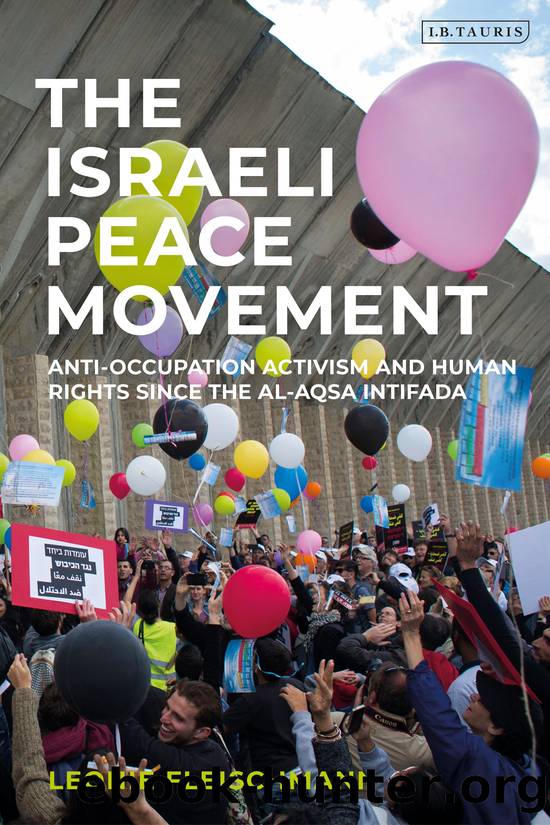The Israeli Peace Movement by Leonie Fleischmann;

Author:Leonie Fleischmann;
Language: eng
Format: epub
ISBN: 9781838600983
Publisher: Bloomsbury UK
6
Beyond the policy realm
Even in the years preceding the creation of the State of Israel, there were Jewish dissenters, who saw the situation differently from mainstream Zionist ideology. They warned not to ignore the indigenous population of Palestine and some argued for a binational state. The events of 1967 led to the emergence of a liberal Zionist peace movement, which was determined to counter the annexationist voices and convince consecutive Israeli governments to exchange the land taken in the 1967 war for peace with their Arab neighbours. Following pressure from the more radical activists, these liberal Zionists began to promote a Palestinian State alongside the Jewish State and saw their vision turn to government policy with the Oslo Agreements. Following the assassination of Prime Minister Yitzhak Rabin, the breakdown of the peace talks at Camp David and the outbreak of the violent Al-Aqsa Intifada in 2000, Israeli society experienced a shift away from a belief in the peace process and a sustained view that there is no Palestinian partner to negotiate with. The perceived failure of the concept of âland for peaceâ permeates Israeli society, along with the view that the military occupation of the Palestinians is necessary to maintain the security of Israel. Given this context, it seems sensible to conclude that any attempt at promoting peace or acting for the end of the occupation would be futile. Indeed, those promoting the liberal Zionist perspective have become irrelevant in the Israeli political sphere.
However, unearthing and analysing the internal characteristics and dynamics of Israeli anti-occupation activism outside the context of the Oslo peace process has shown a different story. Other groups have shifted their narrative and messaging more in line with the Palestinian narrative, acknowledging that there are not two sides in a symmetrical conflict, but a history of colonialism, displacement and disenfranchisement. It is this shift that has enabled them to mobilize consistently and achieve influence in areas beyond the policy realm. Despite highly challenging conditions, a movementâs strategic choices are important and can overcome an unfavourable context. While movements may emerge from political opportunity structures, âtheir fate is heavily shaped by their own actionsâ.1 Understanding how other groups were able âto generate and sustain [themselves] despite recalcitrant political structuresâ,2 provides a much richer picture of this sector of Israeli society.
By virtue of distancing themselves from the Israeli State narrative, Israeli public opinion and even the liberal Zionist component, the radical groups have been able to act despite the obstacles in their way. This has enabled them to develop more confrontational methods of challenging occupation, acting alongside and often at the invitation of Palestinian nonviolent activists. Having been engaged in nonviolent resistance for about a decade, the question of the role of the Israeli activists has emerged, with a consideration of how to use their privileged position to help rather than hinder the Palestinian struggle. As one activist remarked,
we were born to the position of the colonizer, many times we donât even notice, we talk above their heads. I say we because I know Iâm part of it, we all are.
Download
This site does not store any files on its server. We only index and link to content provided by other sites. Please contact the content providers to delete copyright contents if any and email us, we'll remove relevant links or contents immediately.
| Bahrain | Egypt |
| Iran | Iraq |
| Israel & Palestine | Jordan |
| Kuwait | Lebanon |
| Oman | Qatar |
| Saudi Arabia | Syria |
| Turkey | United Arab Emirates |
| Yemen |
Empire of the Sikhs by Patwant Singh(23069)
The Wind in My Hair by Masih Alinejad(5085)
Rise and Kill First by Ronen Bergman(4775)
The Templars by Dan Jones(4679)
The Rape of Nanking by Iris Chang(4197)
12 Strong by Doug Stanton(3541)
Blood and Sand by Alex Von Tunzelmann(3191)
Babylon's Ark by Lawrence Anthony(2670)
The History of Jihad: From Muhammad to ISIS by Spencer Robert(2618)
No Room for Small Dreams by Shimon Peres(2359)
The Turkish Psychedelic Explosion by Daniel Spicer(2352)
Inside the Middle East by Avi Melamed(2348)
Gideon's Spies: The Secret History of the Mossad by Gordon Thomas(2335)
Arabs by Eugene Rogan(2292)
The First Muslim The Story of Muhammad by Lesley Hazleton(2261)
Come, Tell Me How You Live by Mallowan Agatha Christie(2246)
Bus on Jaffa Road by Mike Kelly(2150)
1453 by Roger Crowley(2018)
Kabul 1841-42: Battle Story by Edmund Yorke(2014)
